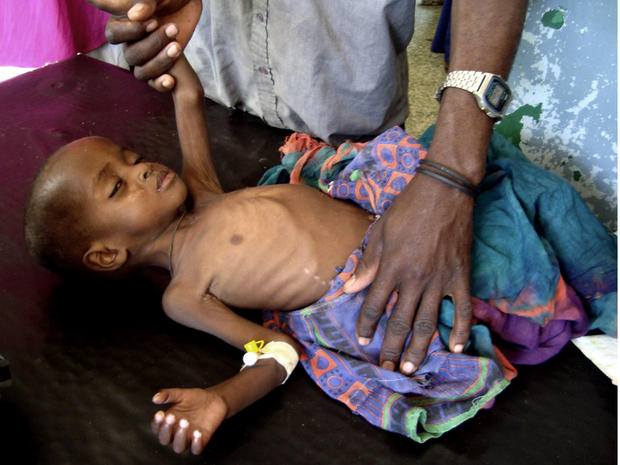Pope, British call for more Somalia famine aid
CASTELGANDOLFO, Italy - Pope Benedict XVI urged the international community on Sunday to move quickly to aid hundreds of thousands of people fleeing drought and famine in Somalia and elsewhere in the Horn of Africa.
He called it a "humanitarian catastrophe" that is "severely testing our brothers and sisters, among them many children."
Benedict issued his appeal after giving his weekly blessing to pilgrims at his summer residence in Castelgandolfo, in the Alban Hills south of Rome.
Aid agencies say the East African drought is one of the worst in years in terms of the number of people affected.
Thousands of Somali refugees are flooding camps in Ethiopia and Kenya in search of food after several seasons without rain decimated livestock and killed crops in their homeland.
U.N. flies aid to terrorist-controlled SomaliaUNICEF's Horn of Africa crisis donation site
Save the Children donation site
Benedict said he was following the crisis "with deep worry" and that he hopes the international community will mobilize quickly.
"Our solidarity and the concrete support of all people of good will are not lacking," the pope said.
Meanwhile, a British official on Saturday called on rich European countries to do more to help some 10 million people who need aid because of a devastating drought in the Horn of Africa.
"We have seen some derisory offers from rich European governments so far," said International Development Secretary Andrew Mitchell.
He told reporters in the Kenyan capital of Nairobi that the British government will give $85 million to drought relief and he urged other nations to contribute more.
"It is a terrible thing in our world that a baby should die from lack of food," he said, describing desperate Somali women and children who had arrived at refugee camps in Kenya on bruised and bleeding feet, having been forced to leave the bodies of family members behind them in the bush.
Mitchell did not mention the Somali government during his speech. A report earlier this year by a Somali government official said Arab donors gave tens of millions of dollars in cash over the past two years. The funds are unaccounted for, one reason donors will work through established charities and not the Somali government.
Tony Lake, the head of the U.N. Children's Fund, said the situation will worsen across the region in coming months because there is no harvest to bring in. He said getting help to families now is crucial.
"All of these people live on the edge in any case," he said, describing a 'perfect storm' of events that had caused the current crisis: drought, rising food and fuel prices, and ongoing conflict in Somalia.
Lake said he had visited communities in northern Kenya where people were living on one meal a day or less. He said one mother was feeding her child pounded nuts moistened with her own saliva because there was no other food and the water in the village well had gone bad.
On Saturday, the U.N. airlifted supplies to drought-ravaged southern Somalia, the first such airlift since Islamist rebels banned aid groups from areas under their control two years ago unless they paid substantial sums of money to the insurgency. They lifted the ban earlier this month and aid groups say the situation there is desperate.
Lake said that aid groups were working with communities to ensure supplies were not diverted.
"Corruption kills children. Period," he said.
